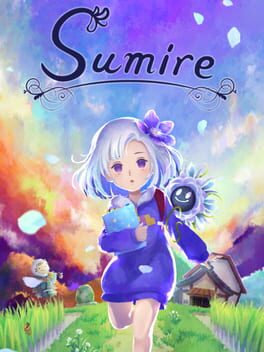ThomVD
2021
This game caught my eye because of its pretty art style and then resided on my wishlist, until it was discounted and I decided to pick it up and play it. I had no expectations going into it, but I cannot express in words how grateful I am that I discovered this gem, as it not only touched me deeply, but also inspired me to push on during a rough time in my life.
Sumire is a narrative-driven “point and click” style adventure game about a young girl that shares her name with the game’s title. She’s going through a difficult phase, having just lost her grandma, who served as the anchor in her life. Her parents have separated, with her dad having disappeared and her mom being depressed and barely capable of taking care of herself and Sumire. Sumire and her previous best friend have also drifted apart as they grew up. She’s lonely and struggles with seeing perspective in her future and having joy in living. One day she meets a flower who only lives for one day, and wants Sumire to take it out with her, making the most of that one single day that the flower has to live. This pushes Sumire to go out of her comfort zone, to experience things she has deep downside wanted to do, to not leave anything unspoken. To be true to her feelings.
Sumire is a coming of age story about grief, loss, growing apart, depression, love and divorce with a bittersweet, at times depressing tone. But above all, it’s hopeful. It shows that any day can make a difference in your life. That those that you’ve lost can still live on inside of you, through your actions, through the impact they’ve had on you as a person. It’s about how you shouldn’t take anything for granted, and how time is limited and you should make the most of it. Do the things you’ve always wanted to do. Sumire brings across its story and messages in such a beautiful, picture-book style way. The writing is excellent, tackling deep and complex themes without ever coming across as pretentious. It is mostly on the nose and easy to follow, but not without its moments of subtlety. Moments where no words are needed. For example a bus ride with no dialogue, just with music and reflection. It gives the audience time to reflect as well, on the story of the game but also on their own lives. With its short 3 hour run-time, it’s impressive how it manages to make most of its cast feel fully realized. Narratively, it’s so well paced and manages to tell a compact yet meaningful story that should be experienced in a single sitting.
Gameplay-wise, the game is nothing special. It mostly consists of making choices that, as far as I know, don’t affect the rest of the story all that significantly. It has a couple of fun simple mini games, some walking around, finding items that may be of use somewhere else. A bit of exploring the picturesque and somewhat mysterious Japanese village in the countryside. The gameplay is definitely not the highlight of the game, but it’s unobtrusive and gently guides the player through the story. There is also not a ton of replay value, despite being able to make different choices giving you the chance to be nice to everyone or a complete ass. To me it just feels that the “evil” choices go so strongly against Sumire’s character and the messages in the story that it’s only really worth going through again for curiosity’s sake.
Sumire is a game that deserves way more attention than it’s currently getting. While it may be lacking in terms of gameplay and length, it tells a genuinely touching, sincere story that might resonate with many who are struggling with certain aspects of life. Whether it’s coping with the loss of a loved one, having drifted apart from a significant other or friend, having to deal with the divorce of parents, or simply just feeling dissatisfied with life. Sumire tells everyone that it’s going to be okay and that it only takes one day to make changes in your life for the better. And that has helped me through a slump, which I'll always be grateful for.
Sumire is a narrative-driven “point and click” style adventure game about a young girl that shares her name with the game’s title. She’s going through a difficult phase, having just lost her grandma, who served as the anchor in her life. Her parents have separated, with her dad having disappeared and her mom being depressed and barely capable of taking care of herself and Sumire. Sumire and her previous best friend have also drifted apart as they grew up. She’s lonely and struggles with seeing perspective in her future and having joy in living. One day she meets a flower who only lives for one day, and wants Sumire to take it out with her, making the most of that one single day that the flower has to live. This pushes Sumire to go out of her comfort zone, to experience things she has deep downside wanted to do, to not leave anything unspoken. To be true to her feelings.
Sumire is a coming of age story about grief, loss, growing apart, depression, love and divorce with a bittersweet, at times depressing tone. But above all, it’s hopeful. It shows that any day can make a difference in your life. That those that you’ve lost can still live on inside of you, through your actions, through the impact they’ve had on you as a person. It’s about how you shouldn’t take anything for granted, and how time is limited and you should make the most of it. Do the things you’ve always wanted to do. Sumire brings across its story and messages in such a beautiful, picture-book style way. The writing is excellent, tackling deep and complex themes without ever coming across as pretentious. It is mostly on the nose and easy to follow, but not without its moments of subtlety. Moments where no words are needed. For example a bus ride with no dialogue, just with music and reflection. It gives the audience time to reflect as well, on the story of the game but also on their own lives. With its short 3 hour run-time, it’s impressive how it manages to make most of its cast feel fully realized. Narratively, it’s so well paced and manages to tell a compact yet meaningful story that should be experienced in a single sitting.
Gameplay-wise, the game is nothing special. It mostly consists of making choices that, as far as I know, don’t affect the rest of the story all that significantly. It has a couple of fun simple mini games, some walking around, finding items that may be of use somewhere else. A bit of exploring the picturesque and somewhat mysterious Japanese village in the countryside. The gameplay is definitely not the highlight of the game, but it’s unobtrusive and gently guides the player through the story. There is also not a ton of replay value, despite being able to make different choices giving you the chance to be nice to everyone or a complete ass. To me it just feels that the “evil” choices go so strongly against Sumire’s character and the messages in the story that it’s only really worth going through again for curiosity’s sake.
Sumire is a game that deserves way more attention than it’s currently getting. While it may be lacking in terms of gameplay and length, it tells a genuinely touching, sincere story that might resonate with many who are struggling with certain aspects of life. Whether it’s coping with the loss of a loved one, having drifted apart from a significant other or friend, having to deal with the divorce of parents, or simply just feeling dissatisfied with life. Sumire tells everyone that it’s going to be okay and that it only takes one day to make changes in your life for the better. And that has helped me through a slump, which I'll always be grateful for.
2021
Hoa is as stressfree and gentle as a game can possibly get. There is no way to take damage or die, and at worst you get set back just a little bit. The puzzles and platforming are very simple and easy. On top of that, the "bosses" at the end of each level aren't there for you fight but rather they help you out by giving you a new power that you can use to advance to the next area. This doesn't mean that the gameplay is boring, it does just enough to make it enjoyable for its duration.
Every minute of Hoa is designed to make you feel relaxed and not to challenge you. This allows the game to focus on its biggest strength. Immersing and moving the player with its stunning audiovisual presentation. It reminded me of Journey in that regard. Both the art style and soundtrack is reminiscent of Studio Ghibli. Sweeping piano melodies that perfectly create a sense of wonder, and a warm and colourful art style with a heavy focus on nature. There were one or two places with some framedrops but nothing that harms the gameplay all too much.
The game is not for everyone however. The lack of challenge will likely turn players off. It's also only 2 to 3 hours long depending on how much you take your time to take in the scenery. There is very little to explore and the replay value is low. I'd say it's only worth the €12 if you generally appreciate these artsy games like Journey, Limbo, etc. For the right target audience it's a beautiful and relaxing experience that will make for a magical afternoon or evening.
Every minute of Hoa is designed to make you feel relaxed and not to challenge you. This allows the game to focus on its biggest strength. Immersing and moving the player with its stunning audiovisual presentation. It reminded me of Journey in that regard. Both the art style and soundtrack is reminiscent of Studio Ghibli. Sweeping piano melodies that perfectly create a sense of wonder, and a warm and colourful art style with a heavy focus on nature. There were one or two places with some framedrops but nothing that harms the gameplay all too much.
The game is not for everyone however. The lack of challenge will likely turn players off. It's also only 2 to 3 hours long depending on how much you take your time to take in the scenery. There is very little to explore and the replay value is low. I'd say it's only worth the €12 if you generally appreciate these artsy games like Journey, Limbo, etc. For the right target audience it's a beautiful and relaxing experience that will make for a magical afternoon or evening.

